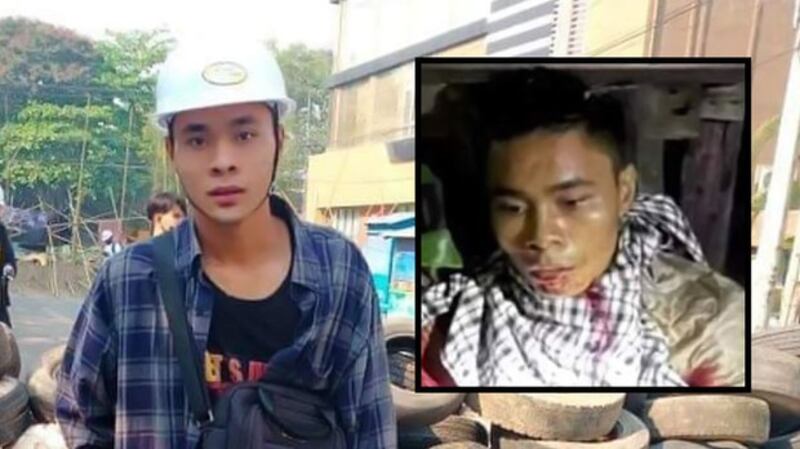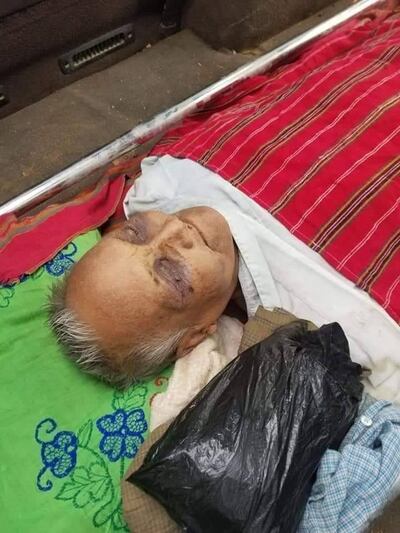More than three dozen civilians have died after being interrogated by the junta since Myanmar’s military seized power in a Feb. 1 coup d’état, including an elderly man who told fellow villagers about how he was brutally tortured before succumbing to his injuries last week.
According to reporting by RFA’s Myanmar Service, at least 41 people who have been questioned as suspects by the authorities have died in detention centers, police prisons, and jails within a few days of their arrest.
At least two people died last week following interrogations, sources told RFA, including a 72-year-old man named Kan Htauk from Hnan Khar village in Magwe region’s Gangaw township and a 30-year-old man named Thet Naing Oo from Kyauk Kan village in Mandalay region’s Myingyan district. A third, 27-year-old Thet Naing Soe of Sagaing region’s Monywa township, died sometime after his arrest on Tuesday.
The military seized power in a coup on Feb. 1, claiming that a landslide victory by the National League for Democracy (NLD) in the country’s November 2020 general election was the result of voter fraud.
It has yet to provide evidence of its claims and has violently repressed widespread protests, killing 1,023 people and arresting 5,975 since the coup, according to the Bangkok-based Assistance Association for Political Prisoners (AAPP).
Amid nationwide turmoil, the military has stepped up offensives in remote parts of the country, triggering fierce battles with local People’s Defense Force (PDF) militias and some of the dozens of ethnic armies that control large swathes of territory along Myanmar’s periphery.
On Aug. 18, a military convoy of 40 vehicles was ambushed with mines planted by members of a branch of the PDF in Gangaw township. That evening, soldiers entered nearby Hnan Khar village and set up a temporary camp. As troops arrived, every able-bodied adult in the village fled their home, leaving only Kan Htauk behind due to his old age and poor health, residents told RFA.
Kan Htauk was taken into custody and severely tortured by the soldiers, he told his fellow villagers after escaping from detention on Aug. 21 and rejoining them, mere hours before his death.
“They asked me if I knew any members of [the PDF],” he said in a testimony that was recorded on video.
“I said I didn’t know, so they kicked me repeatedly. They also pulled my hair and punched my face. I covered my eyes with hands to protect myself.”
Kan Htauk passed away from his injuries the same evening.

Mandalay death
Thet Naing Oo was arrested by junta forces on Aug. 18 in front of the school in his village of Kyauk Kan, where junta troops and paramilitary forces had been stationed, a resident told RFA, speaking on condition of anonymity, citing a fear of reprisal.
His body was sent to the village cemetery less than 24 hours later, the resident said, noting that friends and family discovered severe injuries to his face and head when they went to collect it.
“He had several injuries from torture in detention,” the resident said.
“He is a father of three. He was arrested for riding a motorbike too fast. There was no other reason for his arrest.”
Other residents of the village told RFA they could not understand why the military would have arrested and tortured a regular civilian like Thet Naing Oo.
Told to retrieve body
Thet Naing Soe, an air conditioner repairman in Monywa township, was arrested by the military on Aug. 24, reportedly in Yadanarbon ward, although his family was never informed why or where he was taken.
His mother, who he lived with, along with his two elder sisters, told RFA that his family was notified about his death at 2:00 a.m. the following day and told to retrieve his body.
“There were brown spots on his cheeks that looked like cigarette burns,” she said.
“There were also bruises on his neck. It seemed he was beaten on the back of his neck. There was a bit of blood in his ears and there were bruises on his hands that indicated they had been tied with a rope.”
Thet Naing Soe’s mother said the family buried him shortly afterwards at Myoma Cemetery in Monywa.
A member of Thukahita Funeral Services and Blood Donors Association, speaking on condition of anonymity, said the military had sent Thet Naing Soe’s body to Monywa General Hospital, wrapped up on the pretext that he had died of COVID-19—a common claim made by authorities after someone dies in custody.

Seeking accountability
Aung Myo Min, the human rights minister for Myanmar’s shadow National Unity Government (NUG), said the truth must be uncovered about what happened to the 41 people who have died after being interrogated by the military.
“We are going to set up a mechanism to investigate and prosecute the crimes from the past,” he said.
“We have been submitting the cases of the deaths from military torture and arrest of children to the U.N. Human Rights Council. We will have to work together to bring down the junta to stop these crimes.”
Aung Myo Min said the NUG hopes that evidence of the abuses will lead to serious repercussions for the military during the upcoming 76th session of the U.N. General Assembly in New York next month.
According to RFA’s reporting, civilians who have died in a matter of days or hours after detention include members of the NLD party from Shwe Pyi Thar and Pabaedan townships and the capital Naypyidaw, poet Khet Thi from Sagaing region, and others from Yangon region, Bago region, Mandalay region, Sagaing region and Magwe region.
Reported by RFA’s Myanmar Service. Translated by Ye Kaung Myint Maung and Khin Maung Nyane. Written in English by Joshua Lipes.
